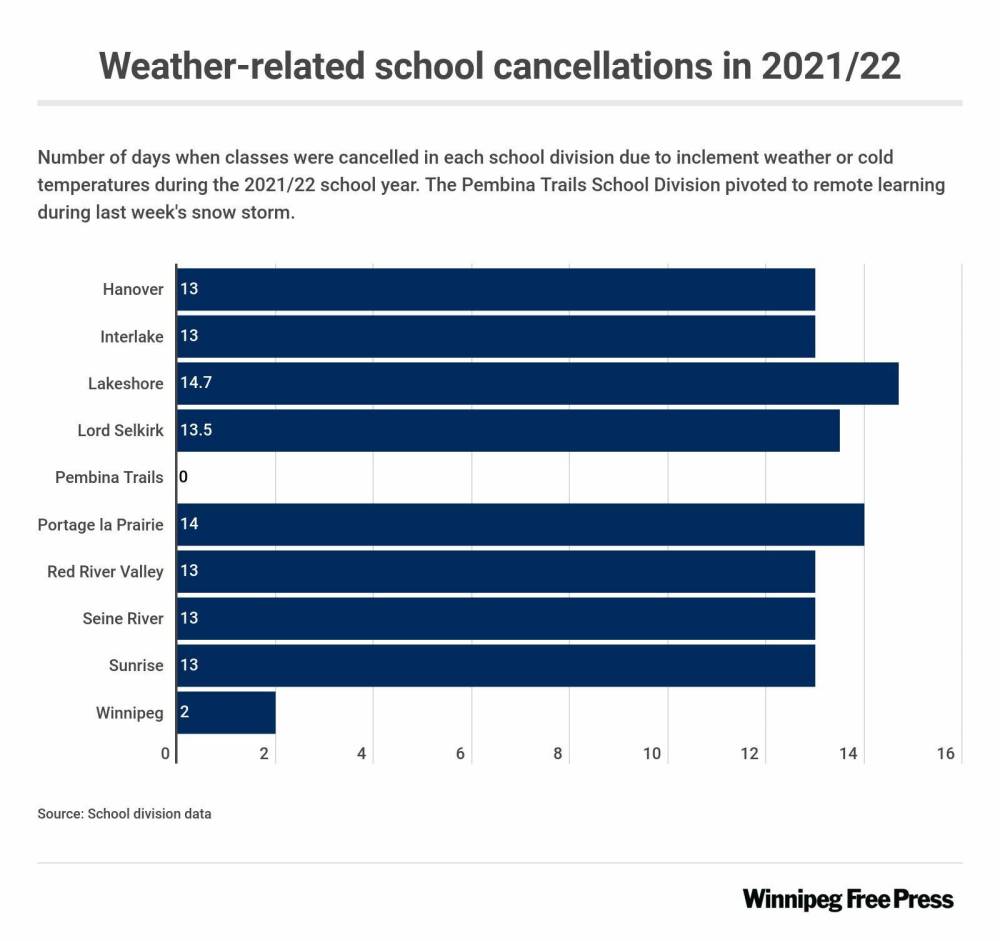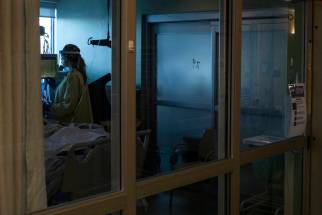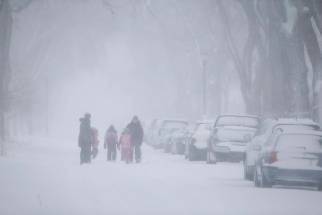Rural schools suffer historic run of bad weather shutdowns
Read this article for free:
or
Already have an account? Log in here »
To continue reading, please subscribe:
Monthly Digital Subscription
$0 for the first 4 weeks*
- Enjoy unlimited reading on winnipegfreepress.com
- Read the E-Edition, our digital replica newspaper
- Access News Break, our award-winning app
- Play interactive puzzles
*No charge for 4 weeks then price increases to the regular rate of $19.00 plus GST every four weeks. Offer available to new and qualified returning subscribers only. Cancel any time.
Monthly Digital Subscription
$4.75/week*
- Enjoy unlimited reading on winnipegfreepress.com
- Read the E-Edition, our digital replica newspaper
- Access News Break, our award-winning app
- Play interactive puzzles
*Billed as $19 plus GST every four weeks. Cancel any time.
To continue reading, please subscribe:
Add Free Press access to your Brandon Sun subscription for only an additional
$1 for the first 4 weeks*
*Your next subscription payment will increase by $1.00 and you will be charged $16.99 plus GST for four weeks. After four weeks, your payment will increase to $23.99 plus GST every four weeks.
Read unlimited articles for free today:
or
Already have an account? Log in here »
Hey there, time traveller!
This article was published 19/04/2022 (1335 days ago), so information in it may no longer be current.
Some rural students in Manitoba have missed nearly three weeks of instruction in 2021-22, as a result of stormy conditions and frigid temperatures.
In addition to COVID-19 pandemic-related disruptions, families and staff members who live and work in public school divisions outside of the Perimeter Highway have been challenged by a spike in snow days.
Repeated school cancellations, which are typically announced around 6 a.m. any given weekday, have forced caregivers to make last-minute child care arrangements, limited learners’ face-to-face learning time, and prompted educators to cram their curriculums.
The average annual number of weather-related school closures between 2004-05 and last year ranged from 1.2 to 5.4 days, according to the education department.
This year, the provincial average — a figure that takes into account the total number of schools that have experienced at least one shutdown as a result of cold weather conditions — has reached eight days.
“I can’t believe we’re having another storm. I’m done with storms,” said Jerret Long, chief executive officer and superintendent of Lord Selkirk School Division, before a Colorado low started moving into the province last week.
At the time, Long called the existing weather and temperature-related closure tally in the division located northeast of Winnipeg — 11.5 — “unbelievable.” That record-breaking figure has since risen to 13.5.
Pembina Trails pleased with remote learning test
Calling its emergency remote operations during last week’s storm a successful trial, Pembina Trails School Division wants to share lessons learned from a “test drive of the 21st-century approach to education.”
The metro division in south Winnipeg stood alone in pivoting to e-learning April 13-14, as opposed to canceling classes outright as Winnipeg, Seven Oaks, Louis Riel, St. James-Assiniboia and River East Transcona did.
As forecasts of a treacherous blizzard started to make headlines, Pembina Trails requested its employees bring home their work technology in the event blustery conditions shuttered in-person classes before the Easter long weekend.
Calling its emergency remote operations during last week’s storm a successful trial, Pembina Trails School Division wants to share lessons learned from a “test drive of the 21st-century approach to education.”
The metro division in south Winnipeg stood alone in pivoting to e-learning April 13-14, as opposed to canceling classes outright as Winnipeg, Seven Oaks, Louis Riel, St. James-Assiniboia and River East Transcona did.
As forecasts of a treacherous blizzard started to make headlines, Pembina Trails requested its employees bring home their work technology in the event blustery conditions shuttered in-person classes before the Easter long weekend.
In an email April 11, superintendent Ted Fransen told staff members to anticipate a shift to remote learning.
At the time, meteorologists estimated 30 to 50 centimetres of snow would hit Winnipeg as a Colorado low weather system made its way up through the Prairies.
“Remote learning is not something you can do on a whim. It’s absolutely dependent on having some time to prepare — and we did,” Fransen told the Free Press, after in-person classes resumed this week.
“If the storm hit Wednesday morning without any warning, it would’ve been a very different situation.”
While Fransen acknowledged attendance varied between cohorts in the division, he indicated some teachers reported 100 per cent attendance to virtual classes last week.
The value of lead time is a key takeaway from this pilot, he said, adding with sufficient notice and access to technology, a remote learning stint unrelated to COVID-19 is a viable option for emergency learning.
— Maggie Macintosh
As metro Winnipeg superintendents recorded the first city school storm-related closures in 25 years, many of their rural colleagues’ tallies had already reached double digits.
Interlake has closed its K-12 buildings for an average of 2.61 days per year over the last 18 academic seasons due to either inclement weather or extreme cold. There have been 13 closures to date in 2021-22.
Lord Selkirk, Seine River, Sunrise, Red River Valley, and Hanover districts have each recorded at least 13 such closures this year. In Lakeshore, classes have been cancelled on almost 15 occasions.
Citing her frustrations, Elizabeth Botterill said she has purposefully not kept track of the number of days her Grade 6 daughter has had to stay home from Oakville School because of blustery conditions.
“I’m absolutely concerned about the education loss… on top of the already existing losses to their education standards from COVID,” she said, adding she worries about progress in all subjects but especially mathematics.
One of her questions for upcoming school conferences is how the elementary building in Portage la Prairie School Division — which has documented more than two weeks worth of weather-related closures in 2021-22 — is tackling catch-up for students as a result of continuous disruptions.
In an email, superintendent Todd Cuddington indicated a 20-year record for school bus cancellations in Portage this year, coupled with significant absenteeism due to COVID-19, has resulted in “significant loss in instructional time.”
The consensus is the safety of children and drivers must always come first, even if closures cause other stresses, said Rod Brownlee, a trustee who oversees the school board.
“Teachers do their best to get everybody in and caught up and stuff, but that number of days (14 cancellations) is just crazy,” said Brownlee, a retired teacher in Portage.
The long-time trustee noted the reality of limited connectivity in rural communities makes the prospect of successful emergency remote learning impossible.
Hanover superintendent Shelley Amos echoed those comments Tuesday.
While the southeastern Manitoba division facilitated remote learning on a cold-weather day (a shutdown caused by temperatures reaching either -35 C or 10 degrees colder, with wind chill taken into account), Amos said classes have been canceled because of 12 different weather-related issues this year.
Effective distance education requires planning time and sudden storms do not often allow for such arrangements, she said.
Despite the high number of closures, Amos said teachers are well-equipped at this point in the year to figure out what outcomes each student still needs to meet.
In a statement Tuesday, a provincial spokesperson acknowledged this winter has been “more extreme than previous years,” but indicated rural and northern schools have significant experience in planning to meet curricular outcomes during condensed school years.
A total of 196 K-12 school days are scheduled in Manitoba in 2021-22.
maggie.macintosh@freepress.mb.ca
Twitter: @macintoshmaggie

Maggie Macintosh reports on education for the Winnipeg Free Press. Funding for the Free Press education reporter comes from the Government of Canada through the Local Journalism Initiative.
Our newsroom depends on a growing audience of readers to power our journalism. If you are not a paid reader, please consider becoming a subscriber.
Our newsroom depends on its audience of readers to power our journalism. Thank you for your support.









